五年级英语上册Module3《Dailylife》教案教科版(广州,三起)
五年级上册英语学案Module3DailylifeUnit6Attheweekend教科版广州
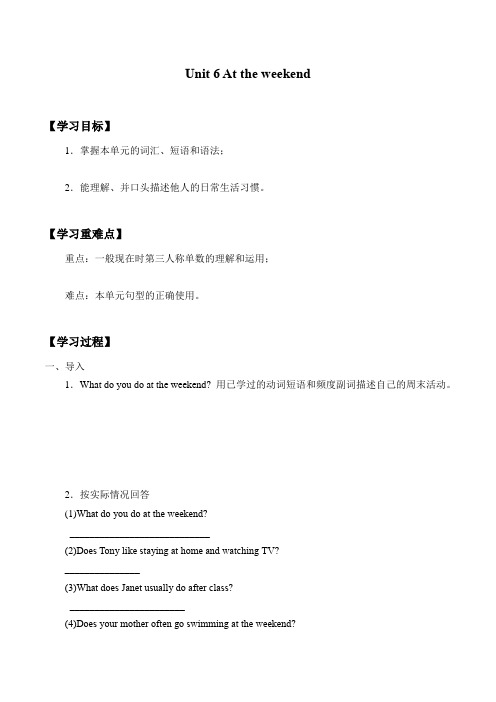
Unit 6 At the weekend【学习目标】1.掌握本单元的词汇、短语和语法;2.能理解、并口头描述他人的日常生活习惯。
【学习重难点】重点:一般现在时第三人称单数的理解和运用;难点:本单元句型的正确使用。
【学习过程】一、导入1.What do you do at the weekend? 用已学过的动词短语和频度副词描述自己的周末活动。
2.按实际情况回答(1)What do you do at the weekend?____________________________(2)Does Tony like staying at home and watching TV?_______________(3)What does Janet usually do after class?_______________________(4)Does your mother often go swimming at the weekend?______________________________________________(5)What time do you usually wake up in the morning?______________________________________________二、单词根据中文意思写单词、词组周末________ 忙的_______醒来_______ 早的_________太太________ 市场________儿子________ 少年宫___________外面________ 娱乐__________电影院________ 极少地___________停留_______ 可能___________国家___________ 一起_____________三、句子仿照例子写句子Mr Li often goes to the cinema at the weekend. 李先生经常在周末去看电影。
daily life学生学案
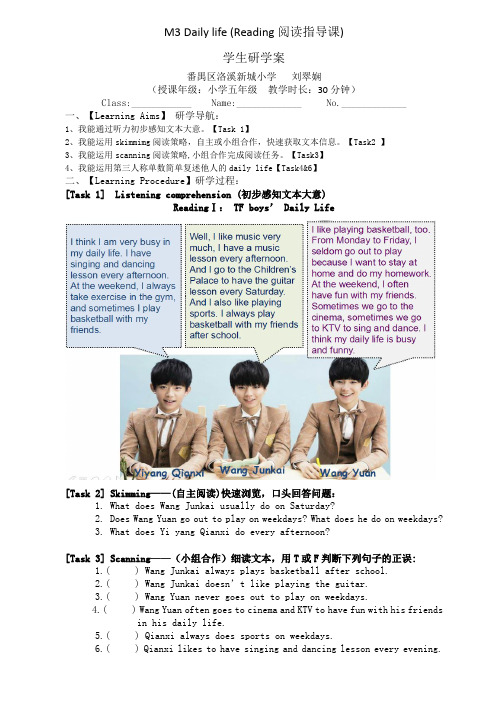
M3 Daily life (Reading阅读指导课)学生研学案番禺区洛溪新城小学刘翠娴(授课年级:小学五年级教学时长:30分钟)Class:____________ Name:_____________ No._____________一、【Learning Aims】研学导航:1、我能通过听力初步感知文本大意。
【Task 1】2、我能运用skimmimg阅读策略,自主或小组合作,快速获取文本信息。
【Task2 】3、我能运用scanning阅读策略,小组合作完成阅读任务。
【Task3】4、我能运用第三人称单数简单复述他人的daily life【Task4&6】二、【Learning Procedure】研学过程:[Task 1] Listening comprehension (初步感知文本大意)ReadingⅠ: TF boys’ Daily Life[Task 2] Skimming——(自主阅读)快速浏览,口头回答问题:1.What does Wang Junkai usually do on Saturday?2.Does Wang Yuan go out to play on weekdays? What does he do on weekdays?3.What does Yi yang Qianxi do every afternoon?[Task 3] Scanning——(小组合作)细读文本,用T或F判断下列句子的正误:1.( ) Wang Junkai always plays basketball after school.2.( ) Wang Jun kai doesn’t like playing the guitar.3.( ) Wang Yuan never goes out to play on weekdays.4.( )Wang Yuan often goes to cinema and KTV to have fun with his friendsin his daily life.5.( ) Qianxi always does sports on weekdays.6.( ) Qianxi likes to have singing and dancing lesson every evening.[Task4] I can talk: Talk about TFBoys’ daily life.[Task5] Write down your daily life in the form. (在表格中填写自己的daily life)[Task6]Try to talk about your classmates’ daily life according the above form. (根据上述表格,谈谈同学的daily life)(五)Homework:Introduce your friend’s daily lifeStep 2: Talk something about your friend’s daily life in a group.。
番禺区洛溪新城小学 (广州版五年级上册)M3 Daily life 阅读指导课(教学设计+学案)

小学英语五年级上册M3 Daily life(Reading阅读指导课)(任教年级:小学五年级教学时长:30分钟)一、学生分析本节课的教学对象是小学五年级学生,经常前面几年的英语学习,他们对英语具有一定的语言知识技能储备,大部分学生对英语有浓厚的学习兴趣及好奇心。
他们不仅活泼好动,爱听爱说,而且善于口头模仿。
小学生的心理和年龄特点决定了学生对有趣的听、说、唱、做、游戏、玩、演、视听等生动活泼的教学活动更感兴趣。
然而,对于中高年级的学生来讲,自主阅读的训练相对缺乏,学生在课堂上静下来阅读的时间寥寥无几,当然也就谈不上对阅读的技能、策略、方法的掌握。
二、教材分析这是一节阅读指导课,话题语言功能是用一般现在时谈论他人的daily life。
在此之前,学生已经掌握了play music, take exercise, do one’s homework, eat ice cream, play computer games, go shopping等日常活动的短语表达,能简单陈述自己的日常行为活动。
但是通过阅读文本获取他人daily life的信息以及运用简单的语言来描述他人的daily life是本模块的教学重点,也是难点。
本节阅读指导课的教学内容与学生日常生活紧密相连,通过TFboys’ Daily life的文本阅读激发学生学习的兴趣,通过自主阅读、小组合作等教学形式,有目的地让学生在获取文本信息的过程中了解一些阅读技能和策略,突出信息的交流和互动,促进获取文本信息的能力。
在教学中以旧引新,降低学习难度,帮助学生积累巩固,提高学生综合运用语言的能力。
三、教学目标A.知识与技能目标:能够听懂、会读、理解文本中的关于daily life的动词短语;B.过程与方法目标:在自主探究、小组合作等学习活动中,能树立自主阅读意识及小组合组探究精神,能在小组合作中与其他同学积极配合,积极运用所学进行表达和交流。
C.情感态度价值观目标:在课堂学习活动中乐于感知并积极尝试使用英语表达,积极参与各种课堂学习活动。
Module 3 Daily life 知识讲解(课件)教科版(广州)英语五年级上册

1. tell sb. sth. 如:She is telling children a story.
她正在给孩子们讲故事。 2. tell sb. to do sth. 如: The teacher tells us to go to school on time. 老师叫我们要按时上学。
拓展 speak/ say/ talk/ tell的区别:
③talk 意为“谈话”,常与介词搭配使用 3. talk with sb. 表示“与......讲话”。(互相) 如: You can talk with me. 你可以和我谈谈。
拓展 speak/ say/ talk/ tell的区别:
dance well 跳得好 2. good是形容词,放在名词前。 如: a good book 一本好书
good idea 好主意
重点考点五
speak + 语言,表示说……语言 如: Can you speak Chinese? 你会说中文吗? Tom can speak English well. Tom能把英语说得很好。
Exercise 一、选出划线部分发音不同的一项。
A B C A C
二.单项选择 1. My father can __A___ very fast . A. swim B. swims C. swimming 2. __A___ you good at ______? A. Are, jumping B. Do, jump C. Can, jump 3.__B___ your brother love _____ music ? A. Does , play B. Does , playing C. Do , playing 4.Let’s __A___ together, Lily. A. dance B. dancing C. dances
五年级英语上册Module3《Dailylife》教案教科版(广州,三起)(2021-2022学年)
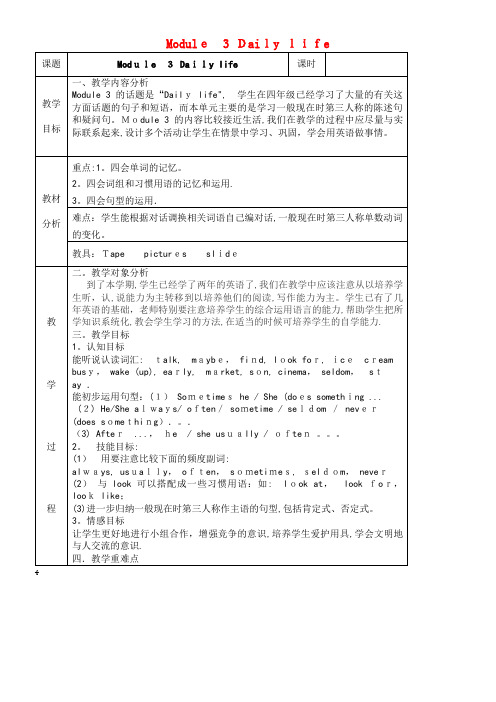
1。Readthetext andtry to act outthe dialogue。
Askthestudents toactinthefrontof theclassroom after5 mins preparation.
2。DotheExercise at P28 Exercise1
4。Learnthe newword: may
T:Look at the vedioand learnthe newword:find(I amlooking forbook,Ican findit。)
5. Let'schant:
Ben Ben。
Whatcanyou do?
I canswim.What about you?
教
学
过
程
一、Warmingup
1.Greeting
2.Chant: Always,often, sometimes andnever
二、Revision andPractice
1。Freetalk
2.Learning objects.
3. Revision
1。Read theverbsadd sor es。
Ican swimtoo。
Iusually swim OnSunday。。
6。Presentthe text.
教
学
过
程
7。Listentho me and find the answer
Name
hobby
can
always oftenneversometimes
Mary
Rose
Ben
8。Read thedialogue
(广东版)开心英语五年级上册教案《Unit3》3
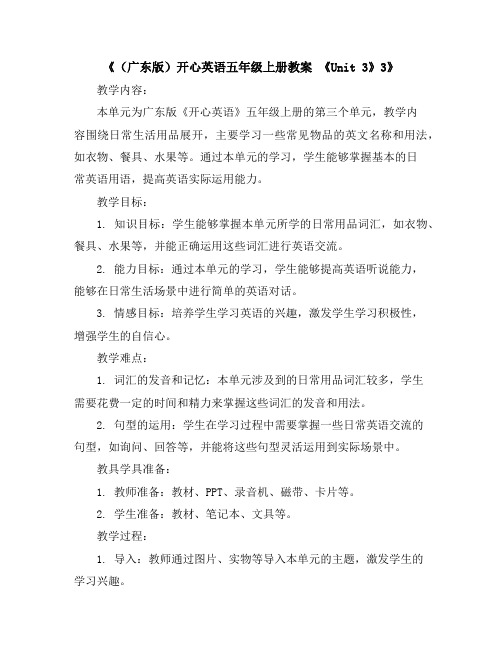
《(广东版)开心英语五年级上册教案《Unit 3》3》教学内容:本单元为广东版《开心英语》五年级上册的第三个单元,教学内容围绕日常生活用品展开,主要学习一些常见物品的英文名称和用法,如衣物、餐具、水果等。
通过本单元的学习,学生能够掌握基本的日常英语用语,提高英语实际运用能力。
教学目标:1. 知识目标:学生能够掌握本单元所学的日常用品词汇,如衣物、餐具、水果等,并能正确运用这些词汇进行英语交流。
2. 能力目标:通过本单元的学习,学生能够提高英语听说能力,能够在日常生活场景中进行简单的英语对话。
3. 情感目标:培养学生学习英语的兴趣,激发学生学习积极性,增强学生的自信心。
教学难点:1. 词汇的发音和记忆:本单元涉及到的日常用品词汇较多,学生需要花费一定的时间和精力来掌握这些词汇的发音和用法。
2. 句型的运用:学生在学习过程中需要掌握一些日常英语交流的句型,如询问、回答等,并能将这些句型灵活运用到实际场景中。
教具学具准备:1. 教师准备:教材、PPT、录音机、磁带、卡片等。
2. 学生准备:教材、笔记本、文具等。
教学过程:1. 导入:教师通过图片、实物等导入本单元的主题,激发学生的学习兴趣。
2. 新课内容学习:教师引导学生学习本单元的日常用品词汇和句型,并通过讲解、示范、练习等方式帮助学生掌握这些知识。
3. 情境模拟:教师创设一些日常生活的情境,让学生运用本单元所学的词汇和句型进行模拟对话,提高学生的实际运用能力。
4. 巩固练习:教师设计一些练习题,让学生对本单元所学内容进行巩固和复习。
板书设计:板书设计要简洁明了,突出本节课的重点内容,方便学生理解和记忆。
作业设计:1. 听力练习:学生听录音,完成相关的听力练习题。
2. 口语练习:学生运用本单元所学的词汇和句型进行口语练习,如模拟对话等。
3. 写作练习:学生根据本单元所学内容,写一篇关于日常用品的英语小作文。
课后反思:重点关注的细节:教学过程2. 新课内容学习:教师引导学生学习本单元的日常用品词汇和句型,并通过讲解、示范、练习等方式帮助学生掌握这些知识。
Unit3DailyLifeLesson1设计

Unit 3 Daily Life Lesson 1教学设计【教学目标】Mastery words and expressions: get up, go to school, go home, go to bed;Oral words and expressions: What do you do on Saturday? When do you get up/go to bed/…?【教学重点】able to listen and read the words and dialogues.able to ask and answer questions.【教学难点】relevant words and dialogues.able to talk.【课时安排】1课时。
【教学过程】Step 1 Let’s talkT:(点击课件,出现做事的图片和时间)When do Bill and Ted get up?S1: They get up at seven o’clock.T: Who can ask more questions? Let’s have a competition.S: What does Bill have for breakfast?T: Good!设计意图:让学生看图提出更多的问题,帮助学生梳理学习过的句子。
Step 2 Read the text and tell the main idea of the text in the students' own words.Let the students speak in front of the class.Encourage them not to be shy when they stand there.Give the students chances to speak loudly in front of the class.Step 3T: Just we talked about Bill and Ted’s daily life. Now let’s talk about yourself. When do you get up?S: I get up at …T: When do you go to school?S: I …T: OK. Let’s ask your partner and finish the chart.学生两人一组说。
daily-life教学设计

Daily life 教学设计教学目标知识目标: 1、掌握下列短语如:at 6:00 in the morning ,at 6:10 in the evening2、掌握句型:---—When do you___?———I (get up) at (6:00 )in the morning。
---When does he/she___?---He/She (goes to bed) at (9:30 ) in the evening.3、能够听懂并理解下列短语:daily life, Olympic Games,begood for,work hard。
能力目标:1、能够运用所学语言描述自己和他人的日常生活。
2、培养学生初步的阅读意识和能力.情感目标:培养学生养成良好的日常生活习惯。
教学重、难点能够正确运用所学句型。
教学过程Step I Warming up and Revision1. Greetings。
2。
Do actions and say with the teacher。
(get up, wash your face,brush your teeth…)(设计意图:通过师生活动热身,复习已学的有关日常生活的动词短语,营造轻松愉快的教学氛围。
)Step II Presentatio n and Practice1.教师通过介绍自己的日常生活引出新授结构---:at ____ in the morning//noon/evening。
(6点起床、12点吃饭、19点看电视等)2.通过师生互动引出新授结构—-—--—-When do you___?---I (get up)at (6:00 )in the morning.———When does he/she___?——-He/She (goes to bed)at ( 9:30 ) in the evening.3.操练并巩固新授内容。
(设计意图:由贴近师生日常生活的情景入手,自然承接复习环节,使学生在不知不觉中去感悟、体会并学习新语言。
教科版三年级起点五年级上册英语《Module 3 Daily life Unit 6 At the we》(一等奖课件) (1)

David is a helpful boy. So on Sunday he usually goes to the church. He sings songs in the church. In the afternoon, sometimes he goes fishing. Sometimes he goes to the hockey club (曲棍球俱乐部)to play hockey with his friends. And he also helps the other people cut the grass. In the evening he always goes to the tree house. It’s very fun. He likes his Sunday so much.
at seven o’clock. Then he usually
goes hiking with his father. He
watches birds flying, feeds the
animals and picks some beautiful
flowers for his mother. In the
twenty-nineth
October 29th (Monday)
Our Daily Life
广州市华侨外国语学校 陈珊
Let’s listen and chant.
Weekend life
Different Children Around the World
David’s weekend
cut the grass
rides horses
教学设计:DailyLife

Unit 3 Daily Life 教学设计(Lesson 2)教学目标:1. 通过听、说、读、写等形式的语言活动,帮助学生复习前几册有关Fruit, Food和Drink等话题的重点词汇和功能句,培养学生综合运用所学语言知识进行交流的能力。
2. 引导学生就所听材料或所读短文内容与他人展开对话交流。
3. 引导学生仿照阅读文段,写出自己拿手菜的制作流程。
教学建议:A. Listen and match.1.复习热身活动(1)快速抢认单词:教师用闪卡的游戏复习有关food和drink的词汇,将单词卡片贴在黑板上。
(2)词汇分类:教师依据黑板上呈现出的词汇进一步提出任务:有些食物是可数的,有些是不可数的,请进行分类。
然后提出问题:What’s your favourite food? 请学生回答。
2. 听前做好准备引导学生看A项图片,并按照可数和不可数的标准对其分类;还可以请学生用铅笔在图片的旁边拼写出英语单词,并注意单复数形式。
然后,请学生先阅读题目要求,预测听力重点,明确听力任务。
分别用T 和B来记录自己所听到的Ted和Bill的早餐需求。
3. 听录音完成任务播放三遍录音,要求学生第一遍整体了解听力内容,第二遍边听边记录相关信息,第三遍边听边查漏补缺,检查并修正答案。
4. 听后核对答案随机抽取学生反馈答案,全班订正。
必要时教师进行讲解。
B. Let's talk.1. 谈论听力内容教师可借助订正听力答案引出本节课要复习的功能句:What does Ted/ Bill want for breakfast? What do you have for breakfast? Do you like eggs/ meat/ apple/ juice …? 和What’s your favourite food?等。
2.说说自己的早餐习惯在了解了Ted和Bill的早餐习惯之后,教师自然而然地将话题转到学生自己的早餐习惯上。
五年级上册英语教案Module 3 Daily life Unit5 Where is Ben 教科版(广州,三起)
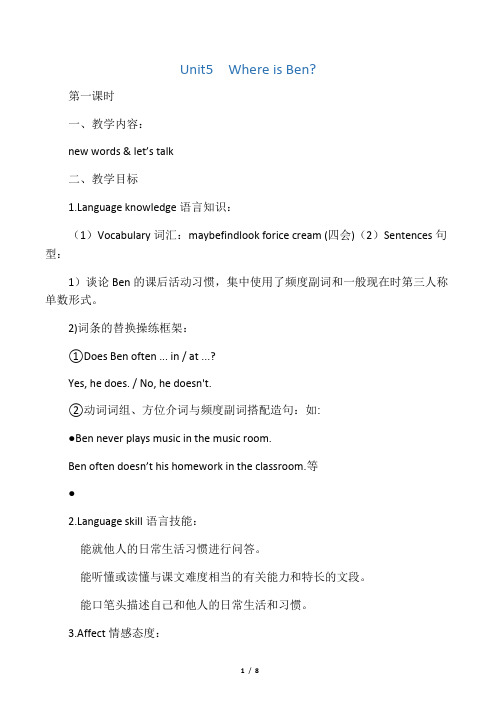
Unit5 Where is Ben?第一课时一、教学内容:new words & let’s talk二、教学目标nguage knowledge语言知识:(1)Vocabulary词汇:maybefindlook forice cream (四会)(2)Sentences句型:1)谈论Ben的课后活动习惯,集中使用了频度副词和一般现在时第三人称单数形式。
2)词条的替换操练框架:①Does Ben often ... in / at ...?Yes, he does. / No, he doesn't.②动词词组、方位介词与频度副词搭配造句:如:●Ben never plays music in the music room.Ben often doesn’t his homework in the classroom.等●nguage skill语言技能:能就他人的日常生活习惯进行问答。
能听懂或读懂与课文难度相当的有关能力和特长的文段。
能口笔头描述自己和他人的日常生活和习惯。
3.Affect情感态度:(1)通过身体语言、多媒体、游戏等多种教学手段结合,提高学生的学习兴趣。
(2)了解他人日常生活,培养良好的生活习惯。
4.Learning Strategies学习策略:(1)学会用基本的语音知识学习单词。
(2)以旧引新,创设情景开展有效教学,让学生在真实的情境中愉快学习,培养学生小组合作的精神与能力。
三、教学重点:1、一般现在时第三人称单数动词的构成2、主语为第三人称单数的一般现在时的各种句式3、描述日常作息的词汇。
四、教学难点:将所学的句子融入实际情景中。
五、课前准备:教学课件、CAI、光盘六、教学过程:一、Warming up1、Let’s sing a song:Always, often, sometimes and never2、让学生说说一些日常作息的词汇,如play musictakes exercise…3、Free talk : A.What’s your hobby?B. What do you usually do on …?二、Presentation and Practice1)创设情境,呈现一些日常生活作息的图片P27页,学习短语及单词。
广州版英语五年级上册Module 3《Daily life》word教案精品
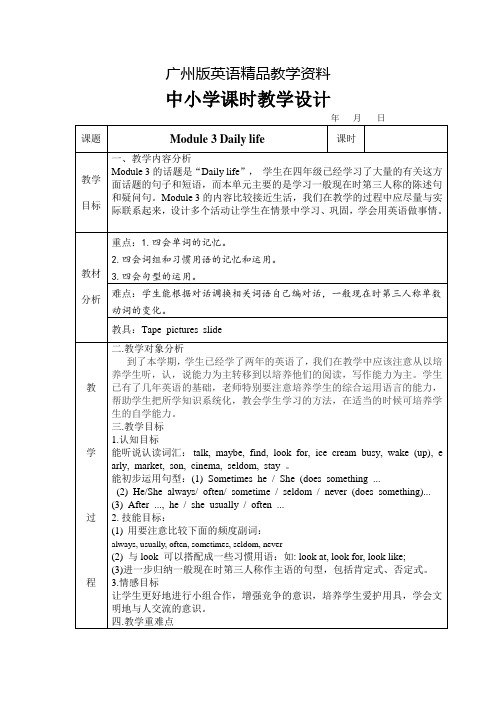
广州版英语精品教学资料教学过程3、一般现在时第三人称单数动词的变化五. 教学策略,媒体:1、采用以旧带新的方法在复习旧知识的基础上巩固、运用、发展新知识,2、设置有趣真实的情境进行教学,利用各种媒体的辅助,并通过做动作、看、听等多样的形式,练透重、难点。
3、利用图片、录音、课件联系实际生活创设情景,让教学情景化。
4、通过创设情景,chant和小组合作活动等教学方式帮助学生学习英语并用英语进行交流了解并掌握知识。
Tape (record) Projection (drawing) Cards六. 课时安排: 8课时板书设计作业设计教学后记增城市中小学课时教学设计年月日一、Warming up1. Greeting2. Chant: Always, often, sometimes and never二、Revision and Practice1. Free talk2. Learning objects.3. Revision1. Read the verbs add s or es.2. Learning objects.3. Look at the pictures and practise the phrases.The pupils read after the teacher, and read together.Attention to the verbs add s or es behind.教学过程Where is Ben? He is in....Does he usually ...?Yes, he usually ..No, he never....Practise the sentences of page275. Do the exercise 2 of page 28.6.Read and write the sentences.7.Summing up.四、 Development.1. Do the Exercise of activity book P9 Exercise 2,P10 exercise 3.五. Homework1.Recite the dialogue at home.2.Write some sentences about daily life.板书设计Unit5 Where is Ben?oftenneverBen usually atalwayssometimes作业设计1.Recite the dialogue at home.2.Write some sentences about daily life.教学后记增城市中小学课时教学设计教学过程2. Show the new words in that sentences, then learn the new words in the sentences.3.让不同的几个学生扮演角色运用Jiamin always goes to.. . 说句子。
广州版小学英语五年级上册Module 3 Daily lifeUnit 6 At the weekend word教案

Unit 6 At the weekend一、Lead in(15 min)1. warm-up:a song ---weekend2 .Free talk: What do you usually do on weekends? Where do you usually go on weekends? (Review the knowledge that they have leant before.)3. Let’s chant together: What Do You Do on the Weekend?What do you do on the weekend?I usually go swimming.Sometimes I climb mountains.Sometimes I go shopping.What do you do on the weekend?I usually play the piano.Sometimes I visit grandparents.Sometimes I watch videos.二、Presentation and practice(45 min)1. Talk about the weekends---about someone’s weekends (analyze the text),and show a form about that.2. Games: Be a reporter--- Make a survey about students’ weekends, let students know the adverbs of frequency. And practice students’oral English.For example, one student ask“Do you usually go swimming?”,andthe other student answer, “Yes, I do. I often go swimming…”. Then the student write down “ xx often goes swimming.”….(That also can let them review the content about the unit3.)3. Games: You do, I guess. To guess phrases from this unit ---- Teacher plays the pictures on PPT, and one student look at the picture and do the actions, and the other students stand in front of the blackboard and can’t look at the picture, according to the actions to guess the phrases andwrite down the phrases.(phrases: wake up, go out, go to the library, stay at home, watch TV, make break fast…)4. Group work:find out your partner, and complete an essay.I usually ______ on the weekend. Sometimes I ________. I can _________ with ______. My friends often ________________. They sometimes ______________ with me. We always have a _____________weekend.三、Additional activities(25 min)Listening: watch a video (The magic cooking pot), and answer the questions, write down 1---5.( ) The girl can tell the pot to cook, but she can't make it stop. She doesn't know the right words.( ) An old woman gives the little girl a magic cooking pot. ( ) A little girl and her mother have no food and no money. ( ) One day the little girl's mother wants some porridge(粥). ( ) And the woman tells her the magic words.五、Summary and homework(5 min)1. Summarize the phrases and adverbs of frequency.2. Homework: Talk about your family’s weekend, and write an article.。
Module 3 Daily life (Revision)(课件)教科版(广州)英语五年级上册
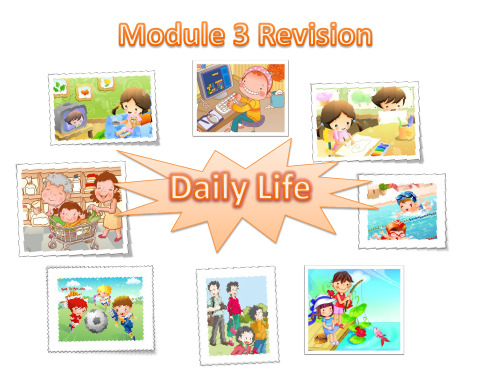
go
have do
out (for lunch)
photos
shopping/fishing
take exercise
Brain Storm running/swimming/skating
to school/work to the market/cinema/park
a shower/bath cook meals
David's weekend
While you are listening, you should try to find out these things:
Who? When? Where? What?
Listening: David’s weekend
1
2
3
4
5
6
The right orders: ___1___ ___5___ ___6___
___3___ ___2___ ___4___
Read and fill in the blanks.
David’s weekend
David is an eleven-year-old boy. He is very busy at the weekend. Hew__a_k_e_s_/_g_e_t_s_ up early in the morning. Then he _g_o_e_s_ to the training school(培训学校). He __h_a_s_ some lessons there. He often answers the teachers’ questions in class. In the afternoon, he often __p_la_y__s basketball with his friends. Sometimes he r_e_a__d_s in the library. He seldom goes to the cinema. He __h_a_s__ dinner at about seven o’clock. He usually _d__o_e_s_ his homework in the evening. Then he w__a_t_c_h_e_s_ TV. After that, he _t_a_k_e_s_ a bath. He often __g_o_e_s__ to bed at about ten o’clock.
- 1、下载文档前请自行甄别文档内容的完整性,平台不提供额外的编辑、内容补充、找答案等附加服务。
- 2、"仅部分预览"的文档,不可在线预览部分如存在完整性等问题,可反馈申请退款(可完整预览的文档不适用该条件!)。
- 3、如文档侵犯您的权益,请联系客服反馈,我们会尽快为您处理(人工客服工作时间:9:00-18:30)。
分析
重点:1.四会单词的记忆。
2.四会词组和习惯用语的记忆和运用。
3.四会句型的运用。
难点:学生能根据对话调换相关词语自己编对话,一般现在时第三人称单数动词的变化。
教具:Tape pictures slide
教
学
过
程
二.教学对象分析
到了本学期,学生已经学了两年的英语了,我们在教学中应该注意从以培养学生听,认,说能力为主转移到以培养他们的阅读,写作能力为主。学生已有了几年英语的基础,老师特别要注意培养学生的综合运用语言的能力,帮助学生把所学知识系统化,教会学生学习的方法,在适当的时候可培养学生的自学能力。
She always...look for
1. Greeting
2. Let’s sing the song.
3.复习句型:I can....Can you ...?
常用动词的用法。
4.Free talk: Can you....?
Yes,I can . I can....
二、Presentation & Practise
1.复习What's your hobby? P:My hobby is….
Module 3 Daily life
课题
Module 3 Daily life
课时
教学
目标
一、教学内容分析
Module 3的话题是“Daily life”, 学生在四年级已经学习了大量的有关这方面话题的句子和短语,而本单元主要的是学习一般现在时第三人称的陈述句和疑问句。Module 3的内容比较接近生活,我们在教学的过程中应尽量与实际联系起来,设计多个活动让学生在情景中学习、巩固,学会用英语做事情。
2.学生能运用一般现在时肯定句.
3.学生能流利读背课文对话并在小组合作的情况下自编对话表演。
4.能听懂和读懂与课文难度相当的有关能力和特长的文段。
教材
分析
教学重点:重点培养学生在情境中运用语言的能力。
教学难点:一般现在时第三人称动词要发生变化。
教具:Tape, pictures
教
学
过
程
一、Warming up
4.Learn the new word: may
T: Look at the vedio and learn the new word: find (I am looking for book, I can find it.)
5.Let’s chant:
Ben Ben .
What can you do?
2、进一步归纳一般现在时第三人称作主语的句型,包括肯定式、否定式。
教
学
过
程
3、一般现在时第三人称单数动词的变化
五.教学策略,媒体:
1、采用以旧带新的方法在复习旧知识的基础上巩固、运用、发展新知识,2、设置有趣真实的情境进行教学,利用各种媒体的辅助,并通过做动作、 看、听等多样的形式,练透重、难点。
3、利用图片、录音、课件联系实际生活创设情景,让教学情景化。
4、通过创设情景,chant和小组合作活动等教学方式帮助学生学习英语并用英语进行交流了解并掌握知识。
Tape (record) Projection (drawing) Cards
六.课时安排: 8课时
板
书
设
计
作业
设计
教学
后记
年月日
课题
Unit 5 Where is Ben?
课时
1st
教学
目标
1.“四会“掌握本课的单词和短语。
(2) He/She always/ often/ sometime / seldom / r ..., he / she usually / often ...
2.技能目标:
(1)用要注意比较下面的频度副词:
always, usually, often, sometimes, seldom, never
Mary
Rose
Ben
8.Read the dialogue
四、Development.
1.Read the text and try to act out the dialogue.
Ask the students to act in the front of the classroom after 5 mins preparation.
三.教学目标
1.认知目标
能听说认读词汇:talk,maybe,find,look for, icecreambusy,wake (up),early,market,son,cinema,seldom,stay。
能初步运用句型:(1) Sometimes he / She (does something ...
(2) 与look 可以搭配成一些习惯用语:如: look at, look for, look like;
(3)进一步归纳一般现在时第三人称作主语的句型,包括肯定式、否定式。
3.情感目标
让学生更好地进行小组合作,增强竞争的意识,培养学生爱护用具,学会文明地与人交流的意识。
四.教学重难点
1、掌握新学的词组,结合以前学习的知识表答自己的能力,为本课的重点。
Are you good at it?Can you...well?
e these sentences and pictures to make a dialogue.
My hobby is swimming./singing.
I can swim fast./well.
3. Show the new words I like ice cream, I often eat it.
2. Do the Exercise at P28 Exercise 1
五. Homework
1.Read the dialogue at home.
2.Copy the New words.
板
书
设
计
Unit 5 Where is Ben?
I often...... may
He usually..... find
I can swim. What about you?
I can swim too.
I usually swim On Sunday..
6.Present the text.
教
学
过
程
7.Listen tho me and find the answer
Name
hobby
can
always often never sometimes
